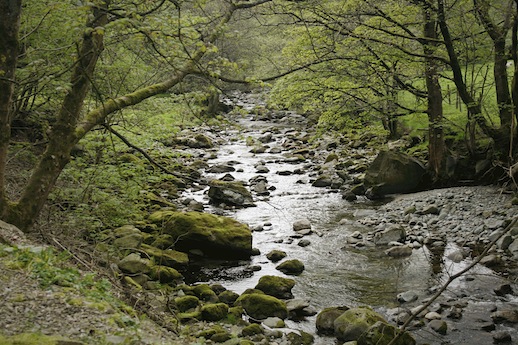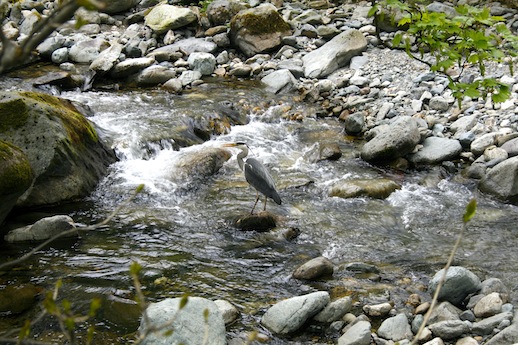Words and pictures by Melissa Harrison
I am staying with my husband and his parents for a week in an old lead-miner’s cottage on a fellside above a Cumbrian lake, the same cottage we stayed in last year, and the year before that. Around the lake rear peaks whose scree-grey tops are often lost in cloud, but whose flanks are green and sheep-dotted lower down. A little river feeds the lake, but I don’t know its name – although we cross it every day, on foot, and follow its course to the shop that sells postcards and pasties and Kendal Mint Cake, where the old man who sits at the till and won’t be rushed counts out your change coin by coin into your hand, and packs the things you buy carefully into a pink-striped bag.
I could find out the name of the river easily enough: I could ask my husband, who has been coming here all his life. Or I could tell you the name of the lake itself, and you could look it up. Then, you could doubtless find out all sorts of things about it, like the size of its catchment area and what its name means and whether angling is allowed. I can say that there are fish in it, going by the silver-grey heron I watched stalking the shallows this afternoon, as casual and lethal as scissors. But, for now at least, my impulse is to resist knowing more than I can see with my own eyes; to hold myself, where the river is concerned, in the no-man’s-land of uncertainty – perhaps, who knows, the better to understand it. You may think it perverse, but consider this: how many times have you seen a bird flit past, watched it perch, named it to yourself (ah yes, chaffinch, easy) – and moved on? And how much closer – how different, qualitatively – has been the attention you’ve paid to the bird whose name you don’t yet know?
I may not be sure what it’s called, but I can tell you some things about this river: its feeling of ice and silk on my fingers, the way its murmur changes when it flows beneath trees. I can describe the dicky-bow metronome of the dipper we saw under the footbridge last year – not the ugly new footbridge, but the mossy old stone one near the campsite. I can tell you that in the village, where it runs inches-shallow between low walls, children paddle and build dams of stones while their parents, all walking poles, gaiters and serious backpacks, watch from the bank.
I can tell you that upstream the river’s character is, in parts, like parts of the Dart, where it rushes in a rocky course and runs overhung with old oaks. I can say, too, that it’s not quite the same. The water may be just as gin-clear and cold, but it doesn’t pool to the Dart’s tea-coloured, tin-coloured depths. The moss on the boulders seems lighter, less luxuriant, and the trees overhead less hung with lichen and epiphytes. The granite boulders of the riverbed are different, too, just as the drystone walls here differ from the drystone walls of Dartmoor. The rock has a different quality, handles differently for walling, and is handled differently by the river. Look it up, if you want. There’ll be a reason for it.
I can’t look anything up, even if I wanted to: we’ve no internet or phone signal at the cottage, so we are disconnected from the vast current of information that’s usually just a few clicks away. You can sometimes pick up a brief flash if you drive half-way around the lake; there’s a layby where a signal bounces in somehow, if the clouds aren’t too low. There, if you’re lucky, your phone will beep and flash, emails, texts and updates days old crowding in like kids in class with their hands up. We bought a dongle this year for the cottage, but it hasn’t worked. It’s not just that my husband needs to hear from his clients, or that I itch for Twitter now and then; after several glasses of wine how can one settle an argument about, say, farming subsidies, or wind farms, without Google, without Wikipedia? One can’t.
But I wonder, sometimes, if arguments really have to be settled; indeed, if opinions must really be formed at all. After all, there is such a lot we don’t know, and can never know; why pretend otherwise? Society is unimaginably various, and other people so very other. Yet taking a firm position can give us an illusion of certainty, and certainty feels safe. Who wants to admit that the world beyond our own, lived experience may be too complicated for easy judgements? Uncertainty – especially in these days of one-click answers and 140-character opinions – feels deeply uncomfortable, but I wonder if learning to tolerate it might be productive. Keats called it ‘negative capability’ – the art of remaining in a state of doubt, “without any irritable reaching after fact & reason”. Being able to keep a truly open mind was, for him, an essentially creative and empathetic act.
You may be tempted to relate these questions of knowledge and certainty to gender. It’s true that I’ve sat at dinner parties, and in pubs, where it’s seemed that the taking and defending of positions is a male task, the finding of common ground, women’s; true, too, that I’ve seen it work the other way. Interesting work is being done about the different ways that men and women relate to landscape and nature, and how pursuits like taxonomy and cartography (naming, mapping) have gendered aspects; psychogeography, too. You could ask me for my opinion on this – perhaps you are already forming one – but for now I’d say, quite honestly, that I am not sure.
I do know one thing: knowledge is beguiling, but it’s also dangerous. Just ask Adam; just ask Eve. It can seem to fix things in place when really they are changeable; can seduce us into thinking things are simple, when they are complex; can lead us to take fixed positions that stem the flow of curiosity – and of empathy, too. It isn’t always better to know.
Perhaps it’s better to be fluid, like the river. Each night, when we’re here, we walk the dog at dusk along an old pack-horse trail on the flank of the fell, sheep bleating invisibly below, red deer moving in the bracken and scree higher up. The valley is dark save for a few farm lights twinkling on the opposite flank; the fells rear black all around, and bats flicker overhead. Somewhere below us runs the river, murmuring its own name to itself as it has for millennia: so much more than the sum of everything I could ever discover about it. My understanding of the river can only ever be partial – but at least I know that.
Read more from Melissa Harrison on Caught by the River here

